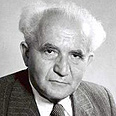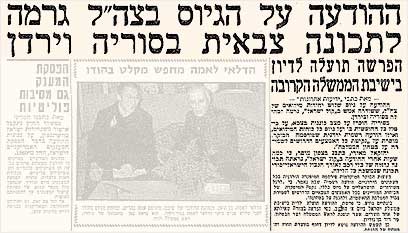
War that wasn’t: 'Night of the Ducks'
April 1, 1959 started out as an ordinary night in Israel, until 9 p.m. when radio broadcast a very unusual message
Indeed April 1, 1959 started out as a very ordinary evening, until 9 p.m. when the radio broadcast a very unusual message that rattled the country and almost brought the Middle East to the brink of a new war.
A mysterious message interrupting a popular radio program provided the first sign of what was to come. During the program “Cantorial Pieces by Request” on Kol Yisrael, the announcer requested the viewers to stay close to their radios and to wait for an important announcement.
News of this announcement passed from person to person, a wave of rumors swirled the country, and the citizens of Israel who were used to obediently following government instructions gathered around their radios and waited for what was to come.
'Water Ducks'
At 9 p.m. the main radio program of Israel Radio opened with a dramatic announcement of a general call up of reserve units. All soldiers whose units were announced were requested to report to their bases the next day. The announcer concluded the message with three military code words: “Artist troupe”, “Important Expression” and “Water Ducks” (The code name that lent this event’s amusing name).
The message was delivered in nine different languages (including Romanian and Yiddish) and no further explanation. Accordingly, the audience understood what was implied - enemies were rising up against Israel, the Syrians were at the gate, in short – war. Alternatively, some optimistic Israelis thought that it was an April Fool’s prank.
With the absence of any official information, many Israelis spent the next hours spreading rumors and guesses and checking their bullet supply in their closets.
Israeli mess
The news of the reserve mobilization did not stop at the borders and quickly arrived across the sea - less than a quarter of an hour after it was broadcast in Israel, international radio programs were announcing the general mobilization of the Israeli army.
Urgent messages were sent to reporters from the foreign press, most of whom were attending a festive celebration at the Cultural Center in Tel Aviv in honor of the Queen of Belgium’s visit to Israel. In attendance as well were Chief of Staff Chaim Laskov and Major General Meir Zorea.
The Prime Minister and Defense Minister David Ben-Gurion heard the announcement in his house.

Yedioth Ahronoth, morning after 'Night of the Ducks'
Anticipating the tumult that would arise, he called the Cultural Center and said to the usher whose bad luck it was to pick up the phone: “This is the Prime Minister, please call the Chief of Staff to the phone”. The usher was convinced it was an impersonator and hung up the phone. Only after a number of calls and hang-ups was Ben Gurion able to get around the usher’s suspicions and convince him of his true identity.
In the Knesset, news of the mobilization hit the parliamentarians like thunder on a clear day. They were gathered in the hall to vote on the state budget and many quickly ran out to their cars to listen to the news on the radio.
A short while later, Justice Minister Pinchas Rosen rose to the speaker’s dais and tried to calm everyone: “I am sure that there were reasons that for the past hour and a half there was no communication between the Prime Minister and Defense Minister and the government, we are used to that”.
Not surprisingly, that joking response did not appease the agitated lawmakers who were rushing to respond. Menachem Begin, then head of the opposition, issued a scathing criticism against the withholding of information from the Knesset, he then demonstrated national allegiance and issued his full support to the IDF.
On the other hand, Knesset member Esther Vilenska (Maki - Israeli Communist Party) made an agitated plea to prevent a military attack: “Our army should not leave the borders of Israel”.
The political and public commotion grew stronger and more confusing, and rightfully so, only a few people knew at that moment what was really behind those announcements.
Minister Levi Eshkol ran out of the Knesset and finally found Ben-Gurion who told him that the mobilization was just an exercise and there was no security risk. The two realized that something went wrong in the defense department, and now they would have to institute a wide spread calming campaign.
Middle-Eastern panic
On the 11 PM news that night, Kol Yisrael was already stating that the mobilization was just an exercise. However, many people in Israel and abroad refused to believe that it was a communication error and were formulating complex and inflaming conspiracy theories. Later, the Soviet news agency connected the event to the state budget and presented a possible motive: “To divert the workers’ attention and to allow the government to insert into the defense clause of the budget 420 million Lirot more than the previous year”.
The expected mobilization of IDF units brought about increased military tension to the Middle East:
A few hours after the announcement, Syria declared military alertness and began to move troops to the border to prepare for an IDF attack. Around midnight, Syrian radio announced a general mobilization of the Syrian army and called on soldiers to report to their bases. The Jordanian army also began to prepare and the next day its officers announced: “In light of the Israeli broadcasts of a general mobilization, the armed forces are implementing all military means to protect the borders and the Hashemite kingdom.”
The next day the state of Israel found itself in an upheaval. After the imaginary security threat was removed, the public was stirred up in a no less important matter - quickly finding and crucifying who was to blame for this fiasco and making fun of those who fell for it.
The headlines in the paper sketched it out: “Before anything was clear, the leader of Herut quickly gave a patriotic speech, lest he miss the opportunity, and the Maki spokeswoman rushed to voice her ridiculous statement” (“Lamerhav” newspaper), “The people who pulled this April Fool’s joke must pay the price”(“Haboker” newspaper).
In light of what was to come, the heads of government and army officers went into offense mode and began placing blame on each other. Contradictory versions arose as to whether the Prime Minister and Chief of Staff knew and approved of the exercise. In order to resolve this military-political complication, Ben-Gurion decided on a famous Israeli magic solution and set up an investigating committee to examine the affair.
In the days afterwards while Israelis were waiting for the committee results to be publicized, Yediothh Ahronoth conducted a short street survey asking people the following question - how did you react to the mobilization call up?
A steam mechanic, from Bat Yam: “I ran home to organize my things because I was sure war had broken out or would break out. I was happy to receive the announcement. In Sinai, I was in a combat unit. I would willingly leave my work routine for a while and go to the front”.
A resident of Givat Shmuel: “I did not get excited. I am a religious woman so I knew nothing would happen to me. Was I afraid that war would break out? I do not get involved in politics”.
A printer at “Kol Hair” newspaper: “I want peace so I was very apprehensive. A large incident could make peace more distant”.
A vegetable storeowner in Tel Aviv: “I am an old soldier from the days of the Brigade and the War of Independence. I don’t tend to get excited easily. I heard the call, drank a few glasses of Cognac and went to sleep. I knew if something would happen, they would come get me in the middle of the night”.
Aftermath
On April 5, the committee submitted an investigate report to Ben Gurion which pinpointed a coincidental failure in the chain of command which let the message be broadcast without meticulous verification and the approval of Laskov and Ben-Gurion (who were not aware of the exact date of the exercise or the problematic wording of the message).
The fact that the planned mobilization of individual units led to mass pandemonium was blamed on “mid-level officers” who implemented the task with “too much enthusiasm”.
In a Knesset discussion Ben-Gurion asked for more time to clarify the matter stating; “I am not a juggler, I can not sit in a meeting and at the same time do other jobs”.
Simultaneously, in a very un-Israeli manner, he demanded the resignation of two IDF generals who were responsible for the exercise: Zorea who served as Chief of Reserves and Yehoshafat Harkabi who served as Chief of Military Intelligence. The two came to his house (separately) for a stormy, personal conversation and refused to step down. Finally the two sides came to a compromise: Zorea would leave his position and would be appointed to General of the Northern Front, and Harkabi would take a short vacation, and at the end he would get his job back (a promise that was not kept).
Apparently, the incident came to an official end and Ben-Gurion summarized it in his journal: “At night a bombshell exploded - a foolish invitation in nine languages, as an introduction to a short broadcast on the mobilization of three small units.”
Years later it was revealed that one of the motives for the mobilization was to tempt the Egyptian air force to conduct a photographic flight into Israel and thus create an aerial ambush.
The point of the exercise (which was led by air force commander Ezer Weizman) was to strike the Egyptian planes and thereby persuade the Egyptians to curtail their aerial incursions into Israeli territory, which they were accustomed to doing frequently at that time. Unfortunately, this sophisticated plan remained only an idea; the Egyptians were not enticed and left their planes on the ground.
In effect, “The Night of the Ducks” continued to reverberate in the security consciousness of the State of Israel for many years. In addition to the scathing insult to those who were ousted, the incident remained a painful and burning memory among IDF commanders, a memory that prevented a general reserves mobilization, until 14 years later on October 6, 1973 - the day the Yom Kippur War started.
Do you have any additional details? Write [email protected]










